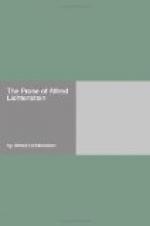The only one who contradicted him was Peter Paulus. He fell—outwardly calm—into such a rage that he said: “If I were a doctor, Father, I myself would—“. In reply the priest said heatedly: “Do you believe in God, Paulus?” And Peter Paulus said only: “No”. A few minutes before the end of the class, he was expelled from the Hebrew lesson because of social democratic leanings and godlessness.
He left defiantly. Slammed the door.
When the widowed prison chaplain Christian Kohn had to give his only child, who was mentally ill and had heart disease, to an institution, he adopted—nobody knows why—a little cripple. There was much gossip. The most obstinate rumor was that the cripple, Kuno, was a natural son of the chaplain. The mother was said to be the popular Trude, who had been convicted of manslaughter after shooting her disloyal pimp. Trude had been pardoned, with the rejoicing approval of the whole village, because it had turned out that she was pregnant. It was claimed that the sympathetic chaplain had caused Trude’s pregnancy. But this was not proved.
Kuno Kohn spent the half-awake first part of his youth in the dreary stone rooms and yards of the penitentiary. His adoptive father had little concern for the boy. He was absent for weeks at a time. Left in the care of a morose servant, whose main occupation was to manage the miserable financial affairs of the chaplain, and lacking sufficient care, lacking playmates, lacking stimulation and love, the crippled child could not develop. Remained always dwarfish. He slunk around, pale and dreamy. Intimidated and timorous. Toward evening, bold shadows and horrific noises teemed on the twisty stairs with their grated windows, and in the great gloomy halls and passages. A more robust boy would have ignored such peripheral things, if he had noticed them at all. But on Kuno Kohn the most insignificant thing left a deep impression, the most minor thing had meaning, and horrified him. Everywhere and from everything he feared disaster. Nothing was familiar to him. The eternal fear made him into a little darting ghost himself, and gave his consumptive eyes a phosphorescent glow. If he was sent out late at night, perhaps to get milk or kerosene, he would pray in feverish fervor to dear God. He would come back breathless and white as chalk.
More than anything, Kuno Kohn was afraid of the thousand-fold darkness before falling asleep. In the past, a tiny lamp had been put into the room for him; the reddish melancholy glow calmed him a little. On the soft wall the strangest grimaces and battles appeared, but also tin soldiers marching and a delightful jumble of fairies and cake plates and queens, until sleep came. After a time, the chaplain decided not to allow any more such mollycoddling of the soul of his son. Kuno would have to live in the dark. Gone was the tiny bit of visibility. The innumerable incomprehensible events of chaos rolled about the




